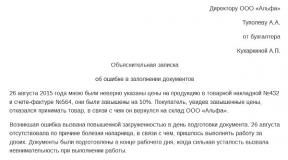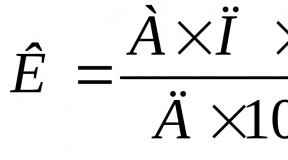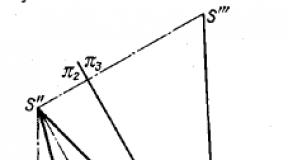Application for early return of the deposit. How to terminate a bank deposit agreement and what it threatens. The legality of the application of penalties in case of early termination of deposits
When investing money in a bank, customers cannot always predict when they will need funds. Unforeseen circumstances or mistakes made when planning the family budget may force depositors to terminate the agreement ahead of schedule. There are many rumors connected with the process of early withdrawal of a deposit from a bank: depositors are intimidated by “fines” and “non-return” of money. How is the procedure for terminating the agreement actually carried out at the initiative of the depositor, and can the bank apply penalties? Let's dwell on these issues in more detail.
Features of early termination of the deposit
There is an unspoken rule in the banking sector: the more stringent the conditions for a deposit, the more profitable it is for the depositor. Credit organizations offer maximum rates when placing funds for a period of 2 years or more, while replenishment and withdrawal of funds from the account is impossible, and interest is paid at the end of the term or annually (quarterly) capitalized. The least profitable option is to make a deposit with the possibility of replenishment and partial withdrawal of funds (within the minimum balance).
Depending on the conditions for placing funds on a deposit account, the bank establishes the procedure for early withdrawal of the entire deposit amount or part of it:
- if the agreement provides for the possibility of partial withdrawal of funds, then the depositor can withdraw them without the application of penalties by the bank. In most cases, the contract indicates the amount of the minimum balance, which must remain on the account. Also, under such agreements, a gradation of interest can be established (the rate depends on the amount in the account). If the depositor wants to withdraw the entire amount, including the minimum balance, the bank has the right to apply penalties. Both in case of full early termination and in case of partial withdrawal of funds, the depositor must notify the bank in advance of his intentions (as a rule, 3-7 working days before the date of withdrawal of the deposit);
- if the agreement does not provide for the possibility of partial withdrawal, then in order to withdraw the entire amount or part of the funds from the account, the depositor will need to terminate the deposit ahead of schedule. The bank has the right to apply penalties and recalculate interest, regardless of whether they have already been paid to the depositor or not.
When withdrawing a deposit, you will need an identity document (passport), as well as the contract itself or the passbook, in which the bank employee must mark the termination. In the branch, the depositor writes an application for closing the account, after which he receives funds at the bank's cash desk (at the request of an individual, they can be transferred to a settlement or card account).
If the depositor wants to withdraw not the entire amount, but only a part, but the agreement does not provide for partial withdrawal of funds, then he can deposit the remaining funds on the deposit by signing a new agreement (respectively, the deposit amount will decrease).
In case of early termination, it is important to know what penalties banks can apply to depositors. More about this.
The legality of the application of penalties in case of early termination of deposits
According to Art. 837 of the Civil Code, the bank is obliged to return the funds to the depositor at his first request. Financial institutions have the right to ask the client to notify them in advance of their intention, but this is done only in order to prepare cash for withdrawal (the cash desk may not have the required amount of cash).
In case of early termination, the depositor must receive an amount not less than that which he initially deposited in the bank. Penalties applied in case of early termination of the deposit may concern only accrued interest. It should be noted that earlier banks could set fines in the amount of 1-15% of the deposit amount, that is, having invested a certain amount in the bank, in case of early termination, customers received back 1-15% less (they also did not accrue interest on the deposit amount).
Now, in case of early termination of the deposit, banks can:
- recalculate interest from the first day of the contract until the moment of its termination at the rate for demand deposits (as a rule, it is tenths of a percent per annum). If part of the interest has already been paid to the client, upon termination of the contract, they will be deducted from the total amount of the deposit;
- recalculate interest at a special rate equal, for example, to 1/2 or 1/3 of the base rate;
- use the combined method. For example, for half a year, calculate the amount of interest based on the base rate, and for the remaining time before the termination date - at the rate for demand deposits;
- establish “full periods” (most often quarters) for which the client receives interest at the current rate. For example, if the period is 3 months, the contract is concluded for a year, and the money was in the account for 8 months, then for 6 months (2 quarters) the bank will calculate interest based on the base rate, and for 2 months (incomplete quarter) - at the rate for demand deposits.
In order to get the maximum benefit from cooperation with the bank even in the event of early termination of the deposit, it is necessary to remember some rules. Recommendations for investors - below.
When signing a deposit agreement, it is necessary to carefully study all its clauses, and in particular, pay attention to:
- terms of placement of funds;
- the presence of an irreducible balance on the deposit;
- the possibility of partial withdrawal of funds;
- the procedure for calculating interest in case of early termination of the contract;
- terms of interest capitalization;
- conditions for prolongation of the deposit;
- termination conditions (how many days before termination of the contract you need to notify the bank of your intention and the form of notification).
If you are not sure that your funds will lie in the account for the entire term, choose a deposit program with the possibility of partial withdrawal of funds or a shorter term of the contract. So you protect yourself from the risk of losing all interest income and can get even a small, but still guaranteed increase in invested funds.
a situation may always arise when it is necessary to terminate the deposit agreement ahead of schedule and use the invested funds. What can he claim and what rights does he have?Fixed-term and non-term deposits
According to the Civil Code of the Russian Federation, in terms of terms, there are two types of deposits. The first is a demand deposit. In this case, the termination and issuance of money occurs at the first request of the depositor. Such deposits are often referred to as perpetual deposits and have a minimum balance.
The second type of deposits provides for the return of the invested amount at the end of a certain period stipulated by the agreement. This is a term deposit. The yield on term deposits is significantly higher than the yield on demand deposits. The latter include regular bank accounts.
Early closing of the deposit, what the law says
Article 837 of Chapter 44 of Part 2 of the Civil Code of the Russian Federation establishes the obligation of the bank to issue a deposit or part of it at the first request of the depositor. This rule applies to all types of deposits of an individual. Any term of a deposit agreement that cancels the closing of the deposit before the expiration date is legally null and void.Thus, any contribution is available to you. And whether it is possible to close the deposit ahead of schedule is not a question at all. It's all about the price of the "event". The only thing the bank can do in this situation is to “punish” the depositor by reducing its interest income. Unless otherwise provided in the agreement, early closing of a bank deposit will lead to the accrual of interest established by the financial institution for demand deposits (clause 3 of article 837). In any case, the rate will be reduced significantly.
Early closing procedure
It is more than simple. Call your manager, or better yet, visit the bank and tell about your situation. It is advisable to do this in advance, especially when the amount is large and / or the deposit is in foreign currency. Usually, everything happens according to an oral application and can take from one to two to three business days.
If the situation becomes more complicated, the application must be made in writing and in two copies. One is to give it to the bank reception, and in the same place, your (second copy) bank employee must register (put down the incoming number and date). If the financial organization is stubborn about returning the deposit, such a statement (together with the deposit agreement) is your main argument in the dispute. The next instances will be the Central Bank of the Russian Federation and the court.
Consequences of early termination
The main loss of the investor is his income. Closing a deposit without losing interest is almost impossible here. The exception is termless demand deposits operating in the mode of ordinary bank accounts.
It should be noted that if the deposit provided for not only the accrual, but also the payment of interest before its end, then here the bank will “catch up” with you. He will withhold his overpaid interest from the “body” of the deposit after the full settlement with you. 
Another risk in early termination is the reputational risk of the client. In the event that you want to close the deposit ahead of schedule for reasons that are not very valid (from the point of view of the bank), it will not be easy for you to claim his loyalty in the future. You must understand that this procedure is undesirable for a financial organization from any point of view. It is necessary to provide additional liquidity, that is, in other words, to find money for you ahead of time. The deposit base shrinks. The only plus for the bank is the compensation of its expenses on accrued/paid interest.
Bank conditions (*)
Consider what the largest Russian banks offer to their depositors in case of early termination of the contract.
Sberbank
If you close the “Save” deposit (the most profitable in Sberbank) ahead of schedule for up to six months, then the income is recalculated at a rate of 0.01% per annum for the entire period. In the case when the term of the deposit exceeds 6 months and you withdraw the money before the expiration of the first half of the year, you will be “rewarded” with the same 0.01%. If you keep the deposit for more than six months, you can already claim two-thirds of the base rate. Also, the currency deposit “Save” is closed ahead of schedule.
VTB 24
The procedure for terminating the bank deposit agreement "Favorable" from VTB24 is somewhat similar to the Savings Bank procedure described above. If the depositor does not withdraw his money ahead of schedule for more than 181 days, then the interest income will be recalculated at a rate of 0.6 of the base rate. We see that state-owned banks are trying to divert customers from the temptation to pull out money very quickly.
Alfa Bank
But in the largest Russian private bank, positioned as a highly profitable deposit, the Pobeda deposit does not give early adopters any chance. In case of early termination, interest is recalculated at the rate of 0.005% per annum. Thus, it is possible to study in the context of favorable conditions for early termination.
Prolongation
 If you didn’t come to the bank (didn’t call, didn’t write), after the expiration of the deposit / agreement, a situation occurs, in some way, the opposite of early termination. The bank can do two things here. The first is to "unload" the body of the deposit and accrued/unpaid interest to your current bank account and close the deposit. The second is to continue (prolong) the contract on the current terms of the product. The so-called automatic extension. Everything is spelled out in key terms. Read carefully.
If you didn’t come to the bank (didn’t call, didn’t write), after the expiration of the deposit / agreement, a situation occurs, in some way, the opposite of early termination. The bank can do two things here. The first is to "unload" the body of the deposit and accrued/unpaid interest to your current bank account and close the deposit. The second is to continue (prolong) the contract on the current terms of the product. The so-called automatic extension. Everything is spelled out in key terms. Read carefully. If there is nothing in the contract, which is extremely rare, then the situation is regulated by clause 4 of the same article 837 of the Civil Code of the Russian Federation. The Bank considers the agreement extended on the condition of a demand deposit. In any case, it will not be superfluous to inquire about the extension mechanism from the specialist serving you.
- Remember, you have the right to always terminate any deposit agreement, no matter what the bankers say or even write - no one has canceled or changed the basic article of the Civil Code.
- Carefully study the conditions of early termination, perhaps they will have a very attractive appearance, and in any case, you need to protect yourself from unpleasant surprises.
- Divide your money into two unequal parts. Place the first, most part on a highly profitable term deposit and try to keep it until the end of the contract. Put the second one, which is smaller, on a demand deposit and have permanent access to it without fines and other "stresses".
- If you have problems with the bank, focus on written correspondence and file everything in a separate folder.
If we have a free amount of money, the best thing to do is to make it work and make a profit. They come to the rescue at a certain percentage: the money is in the account and their amount is gradually increasing. Unfortunately, sometimes we have to resort to early withdrawal of the deposit. It is always connected with some emergency events in the economy or with problems for which we need money to solve. Banks are reluctant to accept such an operation, and depositors are looking for ways to withdraw their deposits competently, without financial losses.
Conditions for early withdrawal of the deposit
They always act in their own interests, therefore they offer the most profitable services only with strict and important conditions for themselves. This applies to both loans and deposits. The term of the deposit implies the actual possession by the bank of your money and the possibility of using it. Therefore, deposits with the highest interest almost always contain conditions to limit early termination of the deposit.
You can withdraw money from a deposit in two forms:
- withdraw money partially, leaving some amount;
- withdraw all the money and completely close the deposit.
You can withdraw part of the money without losing interest only if you have such an opportunity in your deposit agreement. But even in this case, banks usually make a clause in the contract about the minimum amount that must always be on deposit. And if the agreement does not provide for the possibility of withdrawing part of the money at all, then the bank has every right to apply its penalties to you, which are also usually prescribed in the agreement.
If you want to completely withdraw all the money and carry out early termination of the deposit agreement, first of all you should also look at what kind of agreement you have concluded and what kind of deposit you have.
All contributions can be divided into two large groups:
- term deposits, which specifically define the period for which you place your money in the bank and before which the money cannot be withdrawn without consequences;
- demand deposits, which imply the ability to receive your money at any time without penalty.
The first group of deposits always refers to the more profitable deposits in terms of the offered conditions and accrued interest, because the bank takes some obligation from you that it will definitely own your funds for a specific time.
As for demand deposits, in this case the bank no longer has such a guarantee, so it sets very low interest rates. This applies to all deposits with the possibility of early termination, which is spelled out immediately in the contract.
If you have a term deposit, then the bank will apply penalties for early withdrawal of all money and its closure.
Fortunately, at present, the issue of penalties for early closing of a deposit is strictly regulated by federal law, and banks cannot fully regulate this important issue on their own.
According to regulatory documents, banks, in case of early withdrawal of a deposit, can apply only those penalties that relate to the reduction of interest on the deposit. They do not have the right to return to the client an amount less than the original deposit amount.
The bank only has the ability to manipulate interest, so penalties may look like this:
- the toughest way is that the bank actually changes the type of deposit, and recalculates all interest for the entire period from opening to closing not at the rates of term deposits, but at the rates of demand deposits, and then deducts the difference from the total amount of the deposit;
- the bank can simply reduce the current rate on time deposits by half, a third, etc., and then also recalculate all interest;
- the method of combination for a certain period (for example, a year) of the rate on term deposits can also be applied, and for the remaining period until the date of termination of the agreement, the rate on demand deposits;
- the bank can set some reporting periods (for example, 3 months) in which the rate on term deposits will apply, and in the last period, which is less than the reporting period, the rate on demand deposits.
The most important conclusion for all depositors is that the bank is in any case obliged to give you all the money from the deposit at your request, and does not have the right to apply such sanctions that cut the initial amount of your deposit.

Before closing the deposit ahead of schedule, carefully study the following clauses of the agreement:
- for how long you placed your money, and how much you still have left before it ends;
- whether partial withdrawals are allowed and whether there is a minimum account balance rule;
- how the bank will charge interest if you declare the early closure of the deposit (what will be the sanctions);
- general terms of termination (term, documents, etc.).
Typically, banks always set a requirement that customers notify the bank 2-3 business days before the actual withdrawal of money from the deposit in order to prepare the required amount.
After that, you need to come to the bank branch with a passport and a deposit agreement, write an application for early withdrawal of the deposit, and then get your money at the cash desk or ask to be credited to the card.
In any case, try to soberly assess your capabilities before opening a deposit and do not immediately choose term deposits with long terms, but start at least with short-term deposits or with the possibility of partial withdrawals in emergency cases.
What should a depositor know about early termination of a bank deposit? In recent years, Russians have been actively bringing money to banks, and time deposits have become the most popular way to save money and earn additional income. However, no one is immune from unforeseen situations. Money may be required at any time, and then it becomes necessary to forcibly stop the signed agreement.
Today in the article we will look at:
The procedure for terminating the deposit agreement;
how to choose the right term deposit so as not to lose profit in case of early withdrawal of funds;
What to do if the bank refuses to return the deposit.
Attention to the contract
The term of the deposit, as well as other conditions for placing a deposit, are specified in the agreement, which is concluded when placing money in a bank. The Civil Code states that the bank is obliged to return the funds to the depositor on demand. The Bank has the right to reduce the interest rate in case of early termination of the agreement, however, the principal amount of the deposit is returned to the client in full. A credit institution is not entitled to charge penalties for premature withdrawal of funds from a deposit account.
Termination conditions are also described in the deposit agreement. It is necessary to familiarize yourself with them before making a deposit.
Note!
Many banks offer special interest rates for early withdrawals
If there is a possibility that you will have to withdraw the money ahead of time, then pay special attention to the conditions relating to this issue. At the moment, credit organizations are trying to attract customers in various ways, including high interest rates when withdrawing money before the end of the term.
Each depositor must determine for himself which clauses of the agreement are the most important: the amount of the interest rate, the terms of termination, the possibility of replenishing the account or withdrawing part of the funds. In some banks, in case of early withdrawal of funds, the actual deposit rate applies, sometimes 2/3 of it, or interest is recalculated at the rate "On Demand".
Interest rate
The maximum interest rate usually applies to deposits that are placed for a long period with interest paid at the end of the contract. Deposits with the possibility of replenishment and withdrawal of funds, as well as with preferential conditions for early termination, are not concluded on such favorable terms, but in this case you are insured against unforeseen situations.
Often the interest rate depends on the term of the actual deposit in the bank. The longer the money was on the account before the termination of the contract, the higher the rate will be when recalculating interest in the event of closing the deposit. If the funds were kept in the bank for less than half the term, then in case of early termination, the “On Demand” rate applies, and then it gradually increases depending on the term of the deposit in the bank.
The bank does not have the right to change the current terms of the agreement unilaterally. Therefore, they often make references to their tariffs, rules and procedures for servicing individuals. In many cases, when withdrawing funds early, banks introduce hidden fees. For example, for transferring money to a current account and withdrawing cash, the depositor pays a commission.
Note!
In many cases, when withdrawing funds early, banks introduce hidden fees
If your deposit agreement stipulates that the bank can change the conditions unilaterally, you need to pay attention to the items that are subject to change. Credit institutions are obliged to warn about them in advance.
Procedure
In many cases, you can withdraw a deposit from the bank by informing an employee of the branch about your desire. However, if there was no response to the oral request, then the termination of the bank deposit agreement occurs at any time upon a written application from the client. The application can be written in free form, but it must contain all the basic information. A sample document can be asked at the bank or found on the Internet.
The bank employee accepting your application must put the date of acceptance and his signature on his copy. The second copy, certified by a bank employee, remains with the depositor. If the manager refuses to sign the application, then the document must be sent to the bank by registered mail with a notification of receipt. Such documents are required to be registered.
Early termination of the contract does not imply an instant refund to the client. The department may argue the refusal to issue money by the fact that the cash desk does not have the required amount. Therefore, it is advisable to call the bank in advance and inform about your desire to withdraw money, so that at the time of termination of the deposit, the required amount is available at the cash desk.
The document usually prescribes the period after the application is submitted, during which the client can withdraw the money. If the bank does not stipulate this point, then Article 859 of the Civil Code of the Russian Federation states that the credit institution is obliged to return the funds from the deposit within seven days after receiving the application for termination of the deposit agreement. The refund method is specified by the client. This may be a transfer to the current account of an individual or a cash refund.
The credit institution is obliged to return the funds from the deposit within seven days after receiving the application for termination of the deposit agreement
If the bank does not return the deposit
If, after a written request, the credit institution does not return the money to the client, it is necessary to contact the Central Bank of the Russian Federation, which is the regulatory body. Together with the application for the bank's refusal to return the deposit, copies of the application for the return of the deposit and the notification of delivery of the document are submitted.
The refusal of the bank to return the funds is a violation of your rights and is regulated by the Civil Code of the Russian Federation, in accordance with Article 11 of which the protection of citizens is carried out by a court of general jurisdiction. This means that the depositor can apply to the district court at the location of the bank with a claim for the recovery of the unpaid deposit amount and accrued interest from the credit institution. The claim to the court is filed simultaneously with the appeal to the Central Bank.
Appeal to the court is possible only after the bank has given an official refusal to the depositor's application for the forced closing of the deposit or ignored it, but the client still has documents confirming the appeal to the credit institution.
Summary
Most often, early termination of the deposit agreement takes place without problems and is made at the time the client applies with an application to the bank. The depositor may lose interest for placing the deposit, however, he must receive the principal amount that was deposited for storage. In order to make a profit during the stay of money in a credit institution, experts recommend considering all unforeseen situations in advance and choosing deposits with preferential terms for early termination. At the moment, there are quite interesting offers on the market that allow you not to lose interest in case of early withdrawal of money from the account.
“I will buy a deposit with a 25% discount or exchange it for an apartment in Brovary.” There are more and more similar announcements of more than 3.5 thousand bank depositors on the Ukrainian Deposit Exchange, which was created a few months ago, trying in vain to withdraw money from their deposit accounts.
“I will buy a deposit with a 25% discount or exchange it for an apartment in Brovary.” There are more and more similar announcements on the Ukrainian Deposit Exchange, created a few months ago. There are more and more bank depositors trying in vain to withdraw money from their deposit accounts: at the end of 2008, financial institutions did not issue deposits ahead of schedule, now they refuse to return expired deposits. deposits and money from current accounts. It is especially difficult (more precisely, expensive) to get money out of a bank with a temporary administration. However, clients and prosperous financial institutions are ready to sell the deposit at a discount, just to get cash as soon as possible. Contracts figured out how to use legal and illegal methods to recover money stuck in the bank.
Court
The cheapest way to return money from a deposit and a current account
Maria Bereznyuk's deposit expired on March 1st. She kept money in one of the large banks, now a temporary administration operates in this financial institution. “The amount of the deposit is $30,000. I still haven't received even a part of this money,” the depositor says. The bank employees flatly refuse to tell her the date of payment of the funds and the scheme for the return of money.
Sell deposit Average discount on deposits
Maria Bereznyuk wrote an application for the return of the deposit addressed to the head of the bank branch. “The application must be drawn up in two copies: one depositor keeps for himself, the second gives to the bank. The documents must be signed by an employee of the department about the acceptance of the application, put the date and seal of the financial institution, ”comments Yury Kraynyak, managing partner of the law firm Jurimex. The seal of the bank on the depositor's application is required - banks often deny the fact of receiving any written requirements from customers, delaying the return of money. Maria Bereznyuk had to send the document by registered mail - bank employees refused to put a seal on the application, referring to the busyness of the head in charge of the seal. In litigation, notification of receipt by the bank of a registered letter will replace the seal of the financial institution on the document.

After receiving the application, the bank is obliged to consider and respond to it within a month. According to Maria Bereznyuk, the term has not yet expired and the bank has not yet notified her of its decision. If the financial institution refuses to resolve the case amicably, the depositor intends to go to court.
 Before filing documents with the court, the depositor must prepare a package of the following documents:
Before filing documents with the court, the depositor must prepare a package of the following documents:
Bank deposit agreement;
Receipts for depositing money into a deposit account;
Application with a demand
return the money;
Confirmation of receipt of this letter by the bank;
The bank's response to a letter about the early return of the deposit (if any).
Maria will win the case in court - banks do not have the right to delay the issuance of deposits and funds from current accounts, even if the financial institution has a moratorium on satisfying creditors' claims (today - in all banks with temporary administration). This ban does not apply to bank depositors, but only to persons who have issued a loan to a financial institution. Bankers, of course, assure the opposite, but most depositors win cases for the return of deposits in the courts. At the same time, the moratorium on early withdrawal of funds from deposit accounts also does not apply (for more details, see “Was there a moratorium?”). Therefore, a depositor who goes to court with a demand to the bank to return the money will win the case.

The cost of legal services in litigation depends on the rank of the specialist of the law firm (ordinary lawyer or partner of the firm), the reputation of the firm in the market, the specifics of the case (the amount of the deposit, the bank in which the money was hung, the terms of the deposit agreement). For example, the larger the deposit amount, the lower the percentage of commissions charged by intermediaries for a transaction. In any case, most lawyers prefer a mixed payment scheme for their work: partly - for the result (as a percentage of the contribution amount), partly - for doing business (that is, hourly). On average, the cost of returning a deposit through the court, accompanied by a lawyer, will cost a bank client 3-5% of the deposit amount.
Debit cards and offsets
A relatively inexpensive way to return money from a deposit and a current account
It is unprofitable for banks even with temporary administrations to sue depositors - in this case their reputation suffers, and the money will have to be returned under any circumstances. Therefore, financial structures often agree to return deposits to depositors in small parts, for example,  by issuing a debit card in the name of the client. The inconvenience of this refund option for the depositor is limited access to the deposit amount: most banks allow withdrawing no more than UAH 2.5 thousand per day from cards, problematic financial institutions even allow you to receive only UAH 500–700 per day from an ATM. And if you have to use ATMs of partner financial institutions, the client also loses on commissions for cashing out funds (from 2% to 5% of the amount). Financial structures, ready to pay off the owner of a foreign currency deposit and finally earn money on it, offer to transfer money from a deposit account to a card account. Such an operation is beneficial for a financial institution, but not for depositors: the bank exchange rate during such an exchange can be much lower than the market one.
by issuing a debit card in the name of the client. The inconvenience of this refund option for the depositor is limited access to the deposit amount: most banks allow withdrawing no more than UAH 2.5 thousand per day from cards, problematic financial institutions even allow you to receive only UAH 500–700 per day from an ATM. And if you have to use ATMs of partner financial institutions, the client also loses on commissions for cashing out funds (from 2% to 5% of the amount). Financial structures, ready to pay off the owner of a foreign currency deposit and finally earn money on it, offer to transfer money from a deposit account to a card account. Such an operation is beneficial for a financial institution, but not for depositors: the bank exchange rate during such an exchange can be much lower than the market one.
Another option for obtaining deposit funds is to transfer money to the client's current account in another bank. However, even in this case, the depositor loses on commissions for opening an account and transferring money from the deposit.
actual piece of paper How to write an application for a refund of a deposit in a bank (sample)
The most popular method of returning money from a bank deposit is the offset of a loan and a deposit. If the depositor has a loan from the bank where the deposit is placed, he can ask the financial institution to set off these funds to repay the loan. To do this, you must write an application to the credit committee. You can pay off the debt of another person in the same bank with a deposit, having received cash from the borrower. However, in this case, the depositor will not return the entire amount of the deposit, but only part of it (and, of course, without interest on the deposit). Bank borrowers wishing to repay the loan ahead of schedule, as a rule, have on hand only a part of the amount necessary to repay the bank debt. Usually, when offsetting, clients of banks without temporary administration receive from borrowers 80–95% of the deposit amount, with temporary administration - 65–70%.
 |
| - Help to return the deposit |
Settlements are not prohibited by the Banking Law and, according to some lawyers, they should even occur automatically, without the participation of the bank. However, the financial institution may refuse to repay the loan to the borrower who bought the deposit through offsetting. “Before buying a deposit, it is better to consult with banking specialists and enlist their support. Even better is to draw up a trilateral agreement with the participation of the borrower, the depositor and the bank itself,” says Denis Drozd, head of the Ukrainian Deposit Exchange. According to him, offset schemes are beneficial for financial institutions only when repaying a problem loan, when the borrower repays the loan at the wrong time, with incomplete payments. But the bank may refuse to transfer the deposit against the regularly repaid debt, because in the event of an early repayment of the loan, the financial institution loses interest on the loan.

One of the types of offset is the receipt by the depositor of collateral seized by the bank to pay off the deposit. Such an operation is possible if the amount of the deposit is equal to or exceeds the value of, for example, a mortgaged apartment. However, banks try to avoid such operations: they are more likely to sell property for real money than to give it away to pay off a deposit.
A sense of judgment Banks without interim administrations are afraid to sue depositors
In principle, it is quite possible to prepare an offset - to find a client interested in buying a deposit, to arrange a deal - on your own, that is, free of charge (not counting the discount on sale). Settlement under the control of lawyers will cost 1-1.5% of the deposit amount, the total cost of returning the deposit - from 4% to 35-40% of the amount (including a discount when selling a deposit). The whole procedure from submitting an ad on the stock exchange or other Internet resource to offsetting and receiving money by the depositor takes 1.5–2 weeks.
Payment for fictitious services
The most expensive way to return money from a deposit and a current account
Intermediary companies officially engaged in offsetting deposits and loans usually use both semi-legal and super-risk schemes for returning money stuck in the bank. For example, the owner of a current account in a troubled financial institution is denied money. The representative of the intermediary company - as a rule, a lawyer, a former bank employee who has connections in banks and is able to motivate the necessary employees of financial institutions - offers to transfer money to the account of the intermediary company for fictitious services. Further, the intermediary, having received 100% of the money from the account in the problem bank, returns the agreed part of the received amount to the other account of the customer. Depending on the amount on the current account, the fictitious intermediary will keep from 10% (more than UAH 1 million) to 30% (up to UAH 500 thousand) of the current account amount. Such a scheme is very risky for the account holder, since there is a high probability of not waiting for the transfer of part of the amount from the intermediary company.

Click to enlarge
The cost of services of intermediaries for the return of deposits depends on the problem of the bank and the amount, ranging from 12–15% of the deposit amount to 40–50% on average (the return of a deposit in Nadra Bank, Prominvestbank, Ukrprombank costs 30–40% of the deposit amount). One of the intermediary firms estimates its services at 12% of the deposit in any of the banks (the amount of the deposit does not exceed UAH 100,000) or 11% (more than UAH 100,000). “Payment is made only after the payment of the deposit,” the company employee assures. - If the client makes an advance payment of UAH 1.5 thousand, the cost of services is reduced to 9.8% for a deposit up to UAH 100 thousand and to 8.5% - over UAH 100 thousand. The client pays the rest after returning his deposit. However, lawyers do not advise giving advance payment to such intermediaries and generally contacting them. A one-day company can hide with all the money received from investors, and then no one will help return the deposit.
The Fund guarantees
How to get a deposit in the Deposit Guarantee Fund if the bank went bankrupt
At the end of February 2009, the assets of the Deposit Guarantee Fund for individuals amounted to UAH 3.2 billion. As of March 16, 2009, 179 financial institutions were permanent members of the Fund.
The Fund pays compensation only to depositors of bankrupt banks. From October 31, 2008, the maximum compensation amount of the Deposit Guarantee Fund is UAH 150,000 (owners of burnt deposit accounts in the amount of less than UAH 150,000 are fully repaid by the Fund, more than UAH 150,000 are paid the maximum guarantee amount). Deposits in foreign currency are repaid in hryvnia at the rate of the National Bank of Ukraine on the day the bank's liquidator is appointed.
The payment begins within 50 days after the decision to liquidate the bank is made, its clients can receive money within three months at the Fund's agent banks (usually large financial institutions), after that - at the Fund itself. However, according to an employee of the Deposit Guarantee Fund, from the date of bankruptcy of the financial structure until the depositor receives compensation, it usually takes at least six months.
To receive compensation for the deposit, you must have a passport and its copies, a certificate of assignment of an identification code and an application for funds. There is no need to provide the Fund with a deposit agreement - the organization maintains its own database of depositors who have not received their deposits in bankrupt financial institutions.
Over the entire history of its existence, the Fund has paid a little more than UAH 500 million to depositors of such banks as OLBank Ukraine, Slavyansky, Nash Bank, Rostock Bank, Allonge, Premierbank, Garant. Currently, the Fund repays compensation to clients of Intercontinentbank, Kyiv Universal Bank, European Bank for Development and Savings.
Was there a moratorium?
Banks refuse depositors early return of deposits on the basis of the NBU telegram dated 06.12.2008 (No. 22–310/946–17250), which clarified the decision of the National Bank No. 413 dated 04.12.2008. “According to article 1060 of the Civil Code of Ukraine, the bank is obliged to issue a deposit or part of it at the first request of the depositor,” says Yuriy Kraynyak, managing partner of the law firm Jurimex. According to him, refusing to issue money ahead of schedule, the bankers act contrary to the requirements of the Civil Code of Ukraine.
NBU Resolution No. 413 and the telegram do not contain a direct instruction to banks not to issue deposits ahead of schedule. Paragraph 5 of clause 2 of this resolution reads: “Banks are obliged to implement all necessary methods to ensure a positive dynamics of increasing the volume of deposits (primarily in the national currency of Ukraine) in order to prevent early return of money placed by depositors.” In its telegram, the regulator drew the attention of bankers to the fact that “by Decree No. 413 (paragraph 5 of clause 2), banks are prohibited from early return of deposits, since they are invested in long-term loans and other assets.” “The Decree of the National Bank does not contain a ban on early return of deposits,” says Yuriy Kraynyak. “The regulator just indicated that banks should do everything possible to raise funds.”
The lawyer recalls that the telegram is not a regulatory document that can oblige financial institutions not to issue money to depositors. At the same time, Resolution No. 413 is generally invalid. Such a document may come into force only 10 days after its registration with the Ministry of Justice of Ukraine (according to Article 56 of the Law on the National Bank of Ukraine), but the document was never registered with the Ministry of Justice.
Full set
A set of documents required for filing an application with the court
1. Statement of claim
2. Bank deposit agreement
3. Payment document on depositing money by the depositor
4. Letter to bank requesting return of deposit
5. Mail notification of receipt of a letter to the bank
6. Bank response (if any)
7. Receipt of payment of expenses for information technology support and court fee (1% of the amount of the claim, but not more than 1700 UAH)
8. Copies of all documents.



















